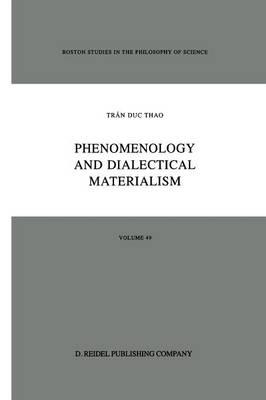Overview
Tran Duc Thao, a brilliant student of philosophy at the Ecole Normale Super- ieure within the post-1935 decade of political disaster, born in Vietnam shortly after the F ir st World War, recipient of a scholarship in Paris in 1935 37, was early noted for his independent and originaI mind_ While the 1930s twisted down to the defeat of the Spanish Republic, the compromise with German Fascism at Munich, and the start of the Second World War, and while the 1940s began with hypocritical stability at the Western Front fol- lowed by the defeat of France, and the occupation of Paris by the German power together with French collaborators, and the n ended with liberation and a search for a new understanding of human situations, the young Thao was deeply immersed in the classical works of European philosophy. He was al so the attentive but critical student of a quite special generation of French metaphysicians and social philosophers: Gaston Berger, Maurice Merleau- Ponty, Emile Brehier, Henri Lefebvre, Rene le Senne, Jean-Paul Sartre, perhaps the young Louis Althusser. They, in their several modes of response, had been meditating for more than a decade on the philosophy of Edmund Husserl, which came to France in the thirties as a new metaphysical enlighten- ment - phenomenology.
Full Product Details
Author: Trân Duc Thao ,
D.J. Herman ,
D.V. Morano
Publisher: Springer
Imprint: Springer
Edition: Softcover reprint of the original 1st ed. 1986
Volume: 49
Dimensions:
Width: 15.50cm
, Height: 1.40cm
, Length: 23.50cm
Weight: 0.433kg
ISBN: 9789401087957
ISBN 10: 9401087954
Pages: 244
Publication Date: 19 October 2011
Audience:
Professional and scholarly
,
Professional & Vocational
Format: Paperback
Publisher's Status: Active
Availability: Manufactured on demand

We will order this item for you from a manufactured on demand supplier.
Reviews
`This work of Thao, in an elegant, laconic, and remarkably lucid prose, elaborates the rationale that motivated Husserl's philosophizing... Thao's knowledge of Husserl, as well as of the entire history of philosophy, is most impressive, and he has the ability to elucidate and bring to life some of the most abstruse epistemological writings of Kant, Husserl, and others. ...consider this one of the clearest introductions to phenomenology and would consider it a superb text to use in introducing my students to phenomenology.' Paul Ricoeur
'This work of Thao, in an elegant, laconic, and remarkably lucid prose, elaborates the rationale that motivated Husserl's philosophizing... Thao's knowledge of Husserl, as well as of the entire history of philosophy, is most impressive, and he has the ability to elucidate and bring to life some of the most abstruse epistemological writings of Kant, Husserl, and others. ...consider this one of the clearest introductions to phenomenology and would consider it a superb text to use in introducing my students to phenomenology.' Paul Ricoeur




